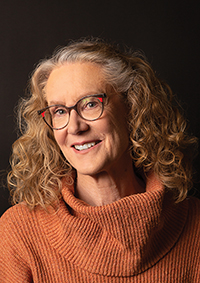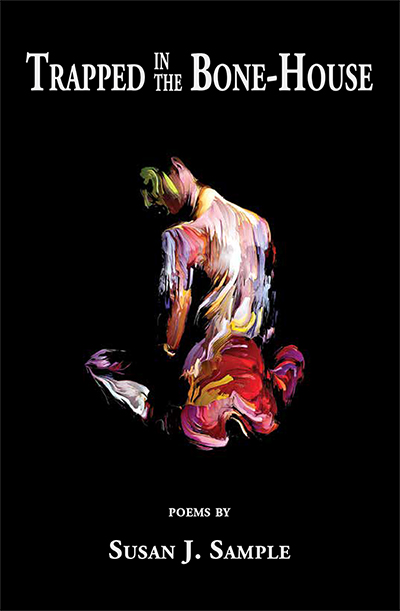Trapped in the Bone-House
poems by
Susan J. Sample
ISBN: 978-1-59948-983-4, 70 pages, $14 (+ shipping)
Official Release/ship Date: January 2, 2024
The Advance Sale Discount price for this title has expired and a firm ship date has been set. For those who prefer to pay by check, the price is $18/book (which includes shipping & sales tax) and should be sent to: Main Street Rag, PO BOX 690100, Charlotte, NC 28227-7001.
 Susan J. Sample is writer-residence at Huntsman Cancer Institute, University of Utah, where she works with patients, families, and caregivers. As faculty in the Department of Internal Medicine, she teaches narrative, medicine, and writing to trainees and physicians. Her work has appeared in Tupelo Quarterly, JAMA, Crab Creek Review, Intima: A Journal of Narrative Medicine, Journal of Clinical Oncology, The Healing Muse, and elsewhere. She is the author of Voices of Teenage Transplant Survivors: Miracle-Like, and two chapbooks, Terrible Grace and Some Unsayable Blue. She has an MFA from the University of Arizona and PhD from University of Utah.
Susan J. Sample is writer-residence at Huntsman Cancer Institute, University of Utah, where she works with patients, families, and caregivers. As faculty in the Department of Internal Medicine, she teaches narrative, medicine, and writing to trainees and physicians. Her work has appeared in Tupelo Quarterly, JAMA, Crab Creek Review, Intima: A Journal of Narrative Medicine, Journal of Clinical Oncology, The Healing Muse, and elsewhere. She is the author of Voices of Teenage Transplant Survivors: Miracle-Like, and two chapbooks, Terrible Grace and Some Unsayable Blue. She has an MFA from the University of Arizona and PhD from University of Utah.
Susan Sample’s poems are stunning. She has a rare gift―the ability to go beneath the surface narrative with honesty, tenderness and the wisdom gained in years of tending the dying, both her family and her patients. These poems are replete with color, varied forms, intelligence and tenderness. “Just say I love them,” she writes in one poem. In this collection she is saying she loves, even when loving is hard. Two words: accomplished and significant. ~Cortney Davis, poet and memoirist
Susan Sample’s Trapped in the Bone House suffuses personal elegy with a medical researcher’s knowledge of how we care for the sick and dying. In these tender, searching poems, Sample not only explores the grief of losing her parents but the emotional and practical ways in which the patients she works with navigate the complexities of their own care. Here, Sample investigates the many kinds and types of language we use to approximate the experience of living as mortal beings. This a book that explores how we come to terms—if we ever do—with the body’s betrayals, and the ways we memorialize and survive our losses. ~Paisley Rekdal
WHY DID I BUY ROSES?
Odd to see leaves fall
onto snow: a playground
littered with lobes turned
into little fists, bloodier
than I remember last week.
It was autumn, though cold,
bitter as the winter
we moved west when I learned
how to win at tetherball:
to reach higher than any
other fourth-grade girl; to
slap the ball hardest,
so the rope wound
fast and tight around the tall
steel pole. My knuckles bled,
skin on the backs
cracked and red.
Last night, I learned
of my mother’s diagnosis.
I walk through the living room,
past a vase of tiny white rosebuds:
Why did I buy roses when
they won’t smell? Petals
already edged with brown?
VACANT WON’T LEAVE ME
I imagine a house: framing completed,
insulation installed, exterior finished,
walkways and driveway graded and poured.
Inside, casements for doors, missing.
Five years, he said, I was
vacant in their life. Wasn’t fair.
How many times I wanted…
Accident on the job. Meds
for pain; then, regrets.
Refills, and more on the street.
Cancer kicked me good.
They took me back in. My ex, my kids,
got to know them as amazing people.
When they sit with me—stopped
to suction saliva
—remember good times…
Does that mean he never fully moved out?
When drywall is hung, spaces between
boards are taped; seams, invisible.
Just say I love them. Tell them,
he said as I typed,
I love you I love you I love you
In the final walk-through,
walls, surfaces are inspected;
fixtures checked, working and in place.
Are his boots, lunch box still in the closet?
Leather gloves on the top shelf holding his shape?
Vacant is
what we are accustomed to
gone missing and
wanted, always.
DYING WILL BE UGLY
the patient in the story says again
until the hospital chaplain
returns from Goodwill:
dark blue suit, shirt
and clip-on tie.
Now, I’m dying pretty…
I marvel at
polyester’s promise
to mend
years disfigured
by alcoholism, abuse;
even his breathless
body as it transforms
into a semblance
of a person. Didn’t
my mother request
her gold dress, earrings
of Swarovski crystals
for her viewing?
Elegance distracting us
from her girlhood:
cans of beans secreted
under relatives’ aprons,
doled without
trust, embalmed
beneath layers
of powder and blush, rouged
lips I can’t help
but touch with my own:
a reflexive gesture
that feels uncanny
as every ugly shade
of love shimmers
with possibility.


 Susan J. Sample is writer-residence at Huntsman Cancer Institute, University of Utah, where she works with patients, families, and caregivers. As faculty in the Department of Internal Medicine, she teaches narrative, medicine, and writing to trainees and physicians. Her work has appeared in Tupelo Quarterly, JAMA, Crab Creek Review, Intima: A Journal of Narrative Medicine, Journal of Clinical Oncology, The Healing Muse, and elsewhere. She is the author of Voices of Teenage Transplant Survivors: Miracle-Like, and two chapbooks, Terrible Grace and Some Unsayable Blue. She has an MFA from the University of Arizona and PhD from University of Utah.
Susan J. Sample is writer-residence at Huntsman Cancer Institute, University of Utah, where she works with patients, families, and caregivers. As faculty in the Department of Internal Medicine, she teaches narrative, medicine, and writing to trainees and physicians. Her work has appeared in Tupelo Quarterly, JAMA, Crab Creek Review, Intima: A Journal of Narrative Medicine, Journal of Clinical Oncology, The Healing Muse, and elsewhere. She is the author of Voices of Teenage Transplant Survivors: Miracle-Like, and two chapbooks, Terrible Grace and Some Unsayable Blue. She has an MFA from the University of Arizona and PhD from University of Utah.